=== 240 BC ===
The IBT sees many battles. Asian Pirates, likely Chinese-hired, tear into the primitive British fleet off the coast of Britannia, and annihiliate it. Egyptian forces are seen winning battles against the demoralised musketmen and bowmen of the Arabs. Songhai, Abyssinia, and the Zulu are also engaged in a war on Arabia thanks to our diplomatic manuevers. This will hopefully keep them from devoting their large East African holdings to gobbling up our captured outposts in the area.
The Arabs win a few battles against Egypt as well. They move many of their wounded musketmen into Suez - which we intend to assault and hopefully take.
Tibet joins the Asian crusade against Mongolia. We also cancel our rights of passage with Persia and Turkistan - readying for the next wave of expansion.
---
Domestically, our empire's next stage of expansion is placed: 2 new bands of settlers arrive in Brazil, and will expand the colony to the northwest and the southeast. Meanwhile, our hired Pirates do their best to wear down the enormous fleets of Asian ships moving into our territorial waters.
Our assault on them is a success, and within a few months, all but one fleet of 2600 men - under the command of Admiral Zhe Xiung - are destroyed.
Next, Germany struck at Murmansk, the last Russian holding in Europe. It fell with relative ease. The Russian Northern Fleet - 230 men strong - now lacked a port, and as a result would decay over time as it was hacked into by a combination of cold, starvation and attacks from Pirates.
With the goal of European unification(except for small, rather uninhabited pockets of land, and the Turkish holdings far to the East) achieved, an envoy was sent to the Soviets. We discovered that Lenin had recently died, being replaced by a young man from Georgia, Iosef Vissarionovich Dzhugashvili - known better by his pseudonym of Joseph Stalin.
Stalin had achieved power through treachery, charisma and sheer force. He dominated the Politburo and was de facto leader and dictator of the Soviet Union. He glorified the army while using horrific political repression and a personality cult to keep power. He referred to the 30-year war with Germany as the 'Great Patriotic War'.
However, Stalin was also a more reasonable person then Lenin. While Lenin had always intended to invade the rest of the world to export his revolution - and thus by nature was Germany's enemy - Stalin's policies were referred to as 'socialism in one country'. Stalin desired to regain the lands Germany had snatched - indeed, most of the territory and population of Russia - but he was willing to compromise.
Stalin's greeting was short and sweet:
Funny coming from the man who was butchering his own people when he could've used them to prosecute the war...
We negotiated peace with Russia on the following terms:
In addition, we were charitable and promised to not do any further ventures into Siberia. We also said the Soviet Union could now claim any non-German land in Turkistan or Siberia. (Roughly the real Soviet Union's territories). To prop up Stalin's regime in 'reperations' *cough* donations *cough*, we promised 50 gold per term for the peace treaty's running.
--- The Crusades Continue ---
With the Russo-German war ended, and the Soviet Union essentially a German puppet state, the next move was planned. We were to strike Suez and Mecca, taking both the strategic isthmus and it's canals, and one of Arabia's largest cities.
Suez fell with little difficulty and few casualties on our part. A large chunk of Arabia's musketmen were cut down, and with the city came a great canal and a great gift - 40 bands of slave workers. They were marked to be shipped to Rome and it's vast slave market immediately.
However, the German government saw oppurtunity... Memphis. Memphis was now fully open to the brunt of our fleets in the Meditteranean, and Templars aboard them. We decided to push our luck... and not too long after, Memphis was reduced to little more then 1/4 of it's original garrison. 4800 Templars then attacked into the heart of Egypt, into the city at the beginning of the Nile Delta. The reasoning for such a move? Population bonuses... and the Pyramids.
During the battle of Memphis, a leader - later known as Aegyptus - emerged. He led the Templars to victory.
With the conquest of Memphis, relations soured when we refused to return the region to Egypt. But it mattered not - thanks to the many inscriptions in the temples around Memphis, we were able to know about all the ways to store grain cheaply and quickly... causing new, advanced granaries to pop up all over the German Reich. We had also banished the Arabs from Egypt, and could now focus our northern efforts on conquering the lands they gave their name to - Arabia.
--- Conquest of Arabia ---
While the Egyptian people welcomed us as liberators and protectors(thousands of Arab troops were stationed around Memphis), we made our advance into their homeland.
To free up troops, the Azure Wall was dismantled in Persia. Our troops set up a new military border to keep India out of the Caucasus regions of Persia. They could have most of the Persian homeland.
While no real offensives were made in Arabia, our hordes of Knights gathered in Medina, and soon they would unleash hell upon the desert.
--- Taming of the Americas ---
While we expanded our power base in South America, in North America we were adding the finishing touches. Forced migration was slowly being used to re-organise the major population centers of the former Iroquois Confederacy, to maximise land and efficiency.
We also exterminated natives who chose to resist us rather then join us or at least accept our hegemony by paying tribute. In the North, the Cherokee - once a tribe that could field 4,300 soldiers -was reduced to only 400 armed troops. This was reduced to 300. The Cherokee fought bravely - albeit futilely - under their leader Sequoya.
In a climactic battle, 8,800 men - who made up the Western Holy Legion - assaulted the small Cherokee force. Losing only 100 men, we slaughtered the entire Cherokee armed force, and captured anybody who had survived the influx of European epidemics as slaves. They would eventually be integrated into the colonial population, but that is another story.
Sequoya was among the first to die, and he was given the Order of the Kaiser posthumously for his bravery to stand up for his people against all odds. A small monument was erected on the battlefield, along with a statue of Sequoya. The Kaiser mentioned him to be someone that Germans should emulate in terms of virtue and personal integrity, regardless of the fact he was from a different culture.
Further south, the less-admirable Arawaks remained a thorn in our side. While the Cherokee had been on land fully under the sway of Germany, the Arawak and the remnants of the Carib tribes were in territories yet to be fully settled, in the frontier of Western Cuba.
600 native troops were cut to 300, and Templars sliced through 100 more. Tired from a long journey westwards and unable to find the other 200, the Templars temporarily gave up their pursuit.
But as the natives of the old colonial regions were absorbed or eliminated, new threats appeared on the Western borders, in the plains:
The Sioux, under their leader Crazy Horse, had assembled a massive army of 18,700 natives, backed up by hundreds of thousands of civilians willing to take up arms as well. They ruled the northern Great Plains with combinations of settlements and nomads. They even raided our frontier to prevent us from expanding further west. Without artillery from Pirate Ships, only sheer force of numbers could defeat such a deadly menace.
--- Unexpected Gains ---
While a shortage of manpower made many assume the large province of Arabic Libya would fall to the hordes of Songhai Impi, re-inforcements arrived from Europe at the last moment, and the result was the fall of Abu Dhabi, greatly enhancing our hold in North Africa. It also yielded to us a source of valuable saltpeter.
With the fall of Abu Dhabi, we sealed off a second front against the Arabs. We hoped to conquer their homeland, while our four African allies would partition Arab East Africa.


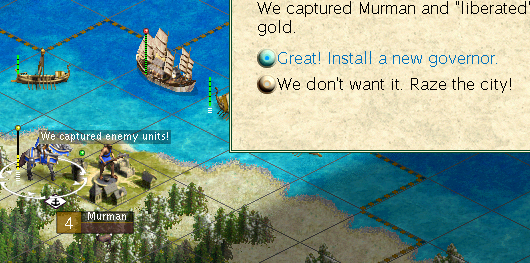


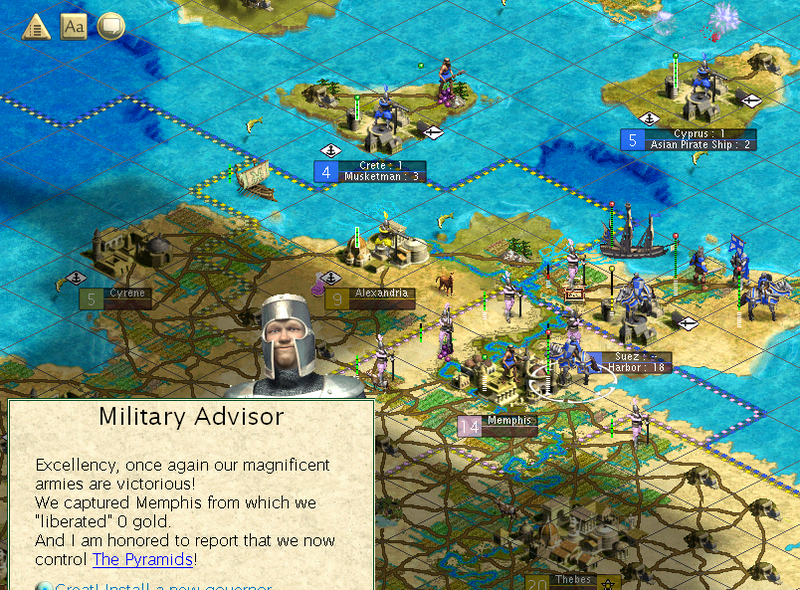
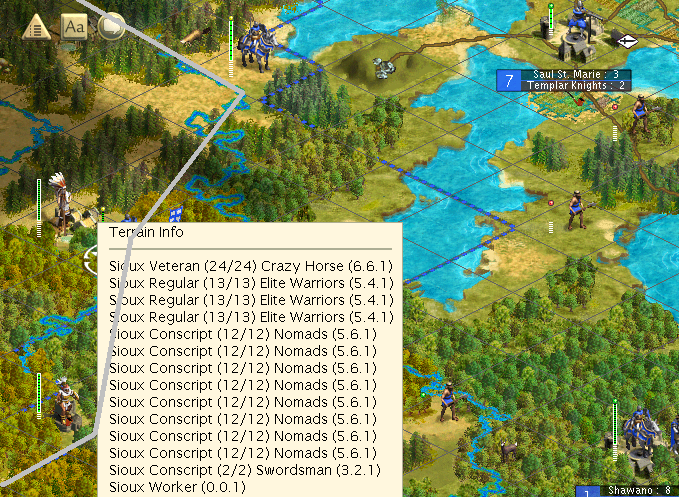
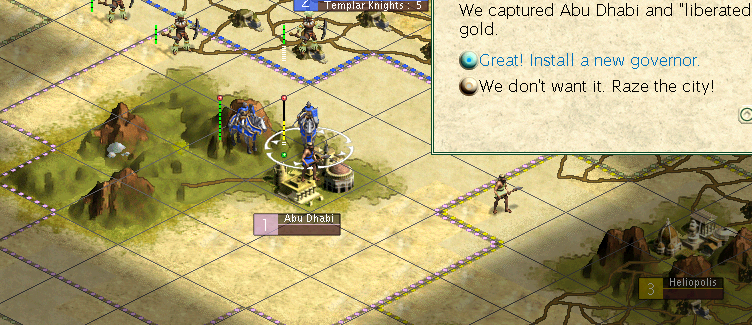
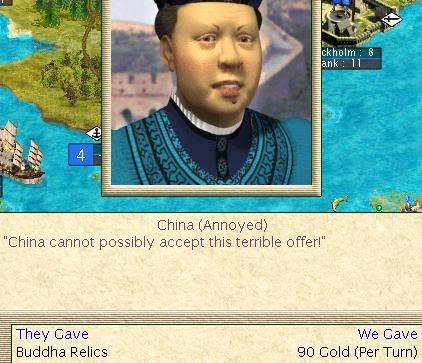
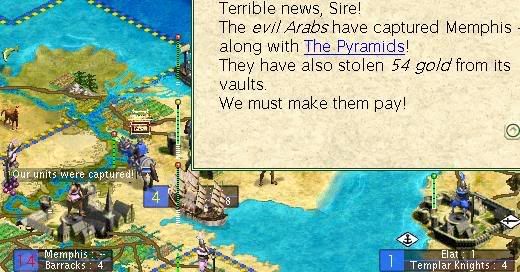
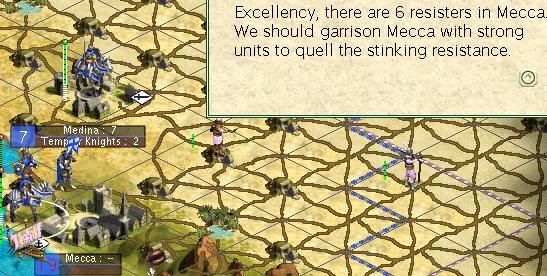
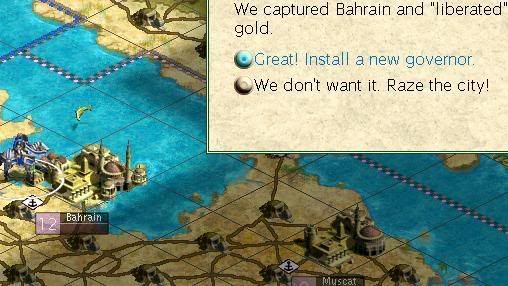
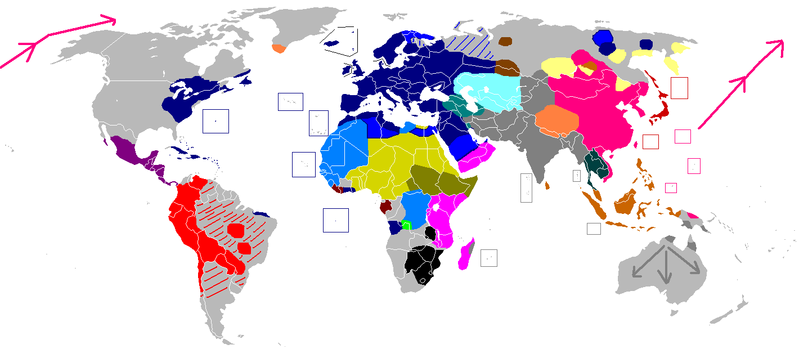
 :muhaha:
:muhaha: 








![Pissed [pissed] [pissed]](/images/smilies/pissed.gif)


